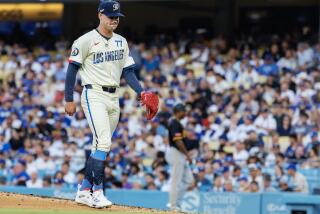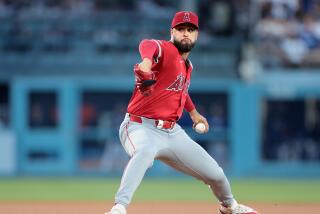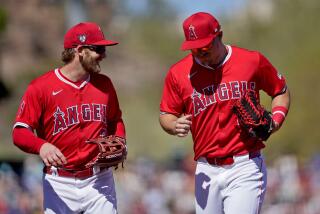Percival Could Be Sidelined Longer
- Share via
There is a fear that closer Troy Percival’s elbow, originally diagnosed as inflamed, could be worse, and that the injury could sideline the right-hander for several weeks.
Percival, who went on the disabled list Aug. 5, has tendinitis in the flexor muscle and neuritis in the ulnar nerve, which is believed to be in the same area he underwent reconstructive elbow surgery seven years ago.
The inflammation needs to be quieted down before Percival even picks up a ball again, but Manager Mike Scioscia is confident that will be sometime in the next week.
“There is no fear of surgery at this point, and that’s encouraging,” Scioscia said. “But obviously his health is at the top of our list, not only for this season but for the future.”
Percival is 4-5 with a 4.85 ERA and 25 saves this season, but he has also blown nine saves, including one in his last appearance against the Indians on Aug. 4.
*
The 121 strikeouts he had entering Saturday night, putting him on pace for 169 strikeouts this season, are not bothering Mo Vaughn.
The Angel first baseman struck out 154 times in 1996, the year he hit .326 with 44 homers and 143 runs batted in, and the whiffs don’t seem to be affecting his overall production this season--he was batting .286 with 27 homers and 87 RBIs through Friday.
What really perturbs Vaughn is his performance against left-handed pitchers, against whom he was batting a paltry .199 with three homers and 12 RBIs going into Saturday night’s game against Yankee lefty Denny Neagle.
“It’s not just bad,” Vaughn said, “it’s horrible.”
Vaughn entered 2000 with a .299 career average against lefties, which made him one of baseball’s most vaunted and reliable No. 3 hitters and almost immune to late-inning pitching changes.
He even hit .336 with 11 homers and 48 RBIs in 152 at-bats against lefties in 1999, when he was hobbled all season by a severely sprained left ankle.
His ankle is sound this season, and outside of a recent problem with a sore left biceps, he has felt great. But any time a lefty pitches, his bat seems to go on the disabled list.
Vaughn has studied camera angles from behind home plate and behind the pitcher’s mound, from high above home and from both the first- and third-base sides of the field.
He has tried different mental approaches, made subtle changes in his stance and his swing. Nothing has worked, though a 425-foot homer on an 0-2 pitch from Neagle in the second inning Saturday night may help.
“There are no excuses, no answers for it,” Vaughn said. “Hopefully over the next seven weeks I’ll get it back. I have to improve. I’m not gonna quit.”
*
Vaughn’s struggles, as well Tim Salmon’s struggles (.216 average) and the team’s record (15-19) against left-handers, spurred some drastic lineup changes Saturday night.
After stressing all season the importance of maintaining continuity in the first six spots, even when certain players were slumping, Scioscia moved Troy Glaus from sixth to second, flip-flopped Vaughn and Salmon in the third and fourth spots and moved Garret Anderson from fifth to sixth.
“You have to respond to a need,” Scioscia said. “You look at Mo’s production against lefties, and it’s not even close to being in line with his career. The way he hit them last year, it’s strange to see that much of a drop-off . . . so it was time to juggle some things.”
But Glaus, who is hardly a prototypical second batter, in the No. 2 hole?
“He’s a good on-base guy with good power,” Scioscia said. “He can be a table-setter and a run-producer. Hopefully he’ll give us a boost.”
Glaus did, doubling in the first inning and smacking his first career grand slam in the second.
More to Read
Go beyond the scoreboard
Get the latest on L.A.'s teams in the daily Sports Report newsletter.
You may occasionally receive promotional content from the Los Angeles Times.






